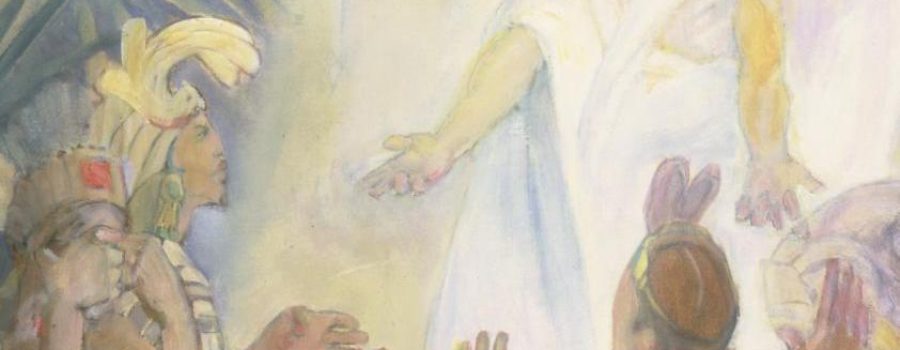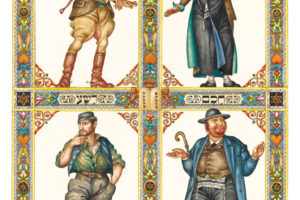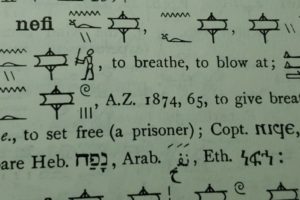In the 8th Century BCE the Prophet Isaiah prophesied saying :
Then shall the Assyrian fall with the sword, not of a mighty man; and the sword, not of a mean man, shall devour him: but he shall flee from the sword, and his young men shall be discomfited. (Isaiah 31:8 KJV)
This prophecy was interpreted by the ancient Jewish followers of Yeshua, known as “Nazarenes” to mean:
And the Devil will fall before you, not because of your powers, but because of the comparison of Elohim. And his young men, who at a certain time earlier fought for him, will be the servants of the Assembly.
This ancient Nazarene interpretation is part of one of five fragments of an ancient Nazarene Commentary on Isaiah, written about 250 CE and now lost. The five fragments are preserved in five quotations quoted by the 4th Century “Church Father” Jerome, in his own commentary on Isaiah.
Some scholars believe that this Nazarene Interpretation of Isaiah’s prophecy pointed to a fulfilment by Paul of Tarsus, who is described as a “young man” at the time he participated in the stoning to death of Stephen (Acts 7:58; 8:1) and “made havock on the Assembly” (Acts 7:3) until his conversion on the road to Damascus (Acts 9) after which, he became an emissary.
While it is fair to point to Paul in regard to this prophecy, both Isaiah, and the ancient Nazarene interpretation of Isaiah, point to plural “young men” not to a singular “young man”.
However, the Stick of Joseph does record an event that fits this prophecy and its ancient Nazarene interpretation perfectly!
According to the Stick of Joseph, Alma the younger, and the four sons of Moshiyah fought on behalf of the Devil to destroy the Assembly:
Now the sons of Moshiyah were numbered among the unbelievers; and also one of the sons of Alma was numbered among them, he being called Alma after his father. Nevertheless, he became a very wicked and an idolatrous man; and he was a man of many words and did speak much flattery to the people. Therefore he led many of the people to do after the manner of his iniquities. And he became a great hinderance to the prosperity of the assembly of Elohim: stealing away the hearts of the people, causing much dissension among the people, giving a chance for the enemy of Elohim to exercise his power over them.
(Moshiyah 11:25)
Like Paul, Alma the Younger and the four sons of Moshiyah had a conversion experience:
And now it came to pass that while he was going about to destroy the assembly of Elohim — for he did go about secretly with the sons of Moshiyah, seeking to destroy the assembly and to lead astray the people of YHWH contrary to the mitzvot of Elohim, or even the king — and as I said unto you, as they were going about rebelling against Elohim, behold, the angel of YHWH appeared unto them, and he descended as it were in a cloud. And he spoke as it were with a voice of thunder, which caused the earth to shake upon which they stood. And so great was their astonishment that they fell to the earth and understood not the words which he spoke unto them. Nevertheless, he cried again, saying, Alma, arise and stand forth! For why do you persecute the assembly of Elohim? For YHWH has said, This is my assembly, and I will strengthen it; and nothing shall overthrow it, except it is the transgression of my people. And again the angel said, Behold, YHWH has heard the prayers of his people, and also the prayers of his servant Alma, who is your father. For he has prayed with much faith concerning you, that you might be brought to the knowledge of the truth. Therefore, for this purpose have I come, to convince you of the power and authority of Elohim, that the prayers of his servants might be answered according to their faith. And now behold, can you dispute the power of Elohim? For behold, does not my voice shake the earth? And can you not also behold me before you? And I am sent from Elohim. Now I say unto you, go, and remember the captivity of your fathers in the land of Helam, and in the land of Nefi, and remember how great things he has done for them. For they were in bondage, and he has delivered them. And now I say unto you, Alma, go your way, and seek to destroy the assembly no more, that their prayers may be answered. And this, even if you will of yourself be cast off. And now it came to pass that these were the last words which the angel spoke unto Alma, and he departed.
(Moshiyah 11:26)
After this conversion experience (detailed further in Moshiyah 11:27-28) Alma the Younger and the four sons of Moshiyah, actually came to serve the Assembly:
And now it came to pass that Alma began from this time forward to teach the people, and those who were with Alma at the time the angel appeared unto them: traveling round about through all the land, publishing to all the people the things which they had heard and seen, and preaching the word of Elohim in much tribulation, being greatly persecuted by those who were unbelievers, being smitten by many of them. But despite all this, they did impart much consolation to the assembly, confirming their faith, and exhorting them with long – suffering and much travail to keep the mitzvot of Elohim. And four of them were the sons of Moshiyah. And their names were Ammon, and Aharon, and Omner, and Himni — these were the names of the sons of Moshiyah. And they traveled throughout all the land of Zerach’mla, and among all the people who were under the reign of king Moshiyah, zealously striving to repair all the injuries which they had done to the assembly, confessing all their sins, and publishing all the things which they had seen, and explaining the prophecies and the scriptures to all who desired to hear them. And thus they were instruments in the hands of Elohim in bringing many to the knowledge of the truth, yes, to the knowledge of their Redeemer. And how blessed are they, for they did publish shalom; they did publish good tidings of good, and they did declare unto the people that YHWH reigns (Isa. 52:7)
(Moshiyah 11:29)
It is interesting that M’raman, in his abridgement of the plates, cites the prophecy of Isaiah 52:7 here, because Isaiah 52:7 describes a message that is proclaimed, in spite of oppression by “the Assyrian” (Isaiah 52:4) which the ancient Nazarene commentator had interpreted in Isaiah 31:8 to be the Devil, who falls in relation to the young men that had fought for him to oppress the Assembly, becoming instead, servants of the Assembly, proclaiming the good news! M’raman clearly understood the conversion of these young men pertained to the prophecy in Isaiah 31.
This prophecy of Isaiah, and especially the ancient Nazarene interpretation of it, was fulfilled, not by Paul, who was only one man, but by the “young men” Alma the younger and the four sons of Moshiyah as recorded in the Stick of Joseph!






Leave a Reply